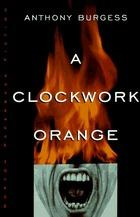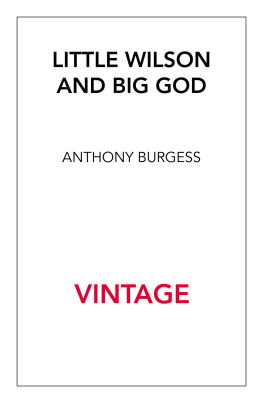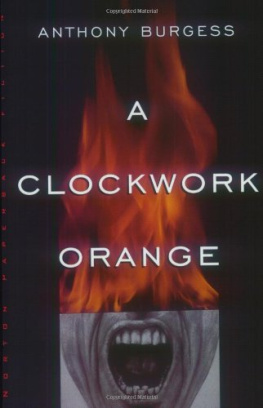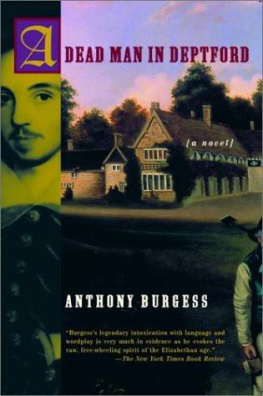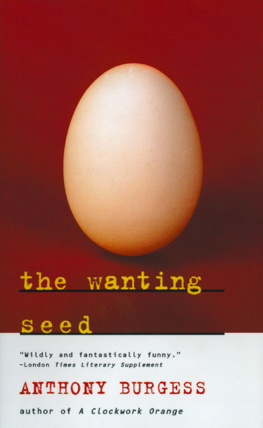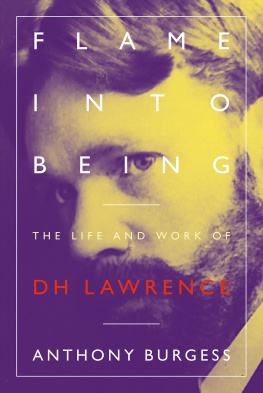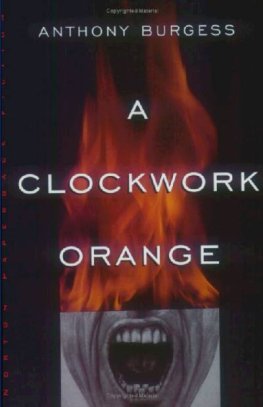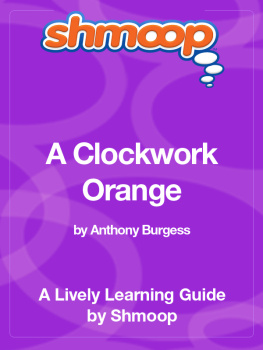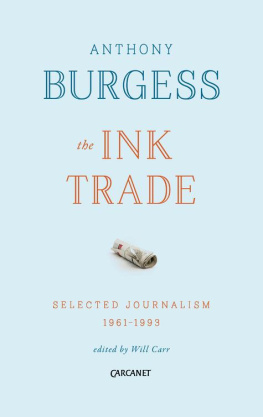Anthony Burgess - A Clockwork Orange (UK edition)
Here you can read online Anthony Burgess - A Clockwork Orange (UK edition) full text of the book (entire story) in english for free. Download pdf and epub, get meaning, cover and reviews about this ebook. year: 1986, genre: Art. Description of the work, (preface) as well as reviews are available. Best literature library LitArk.com created for fans of good reading and offers a wide selection of genres:
Romance novel
Science fiction
Adventure
Detective
Science
History
Home and family
Prose
Art
Politics
Computer
Non-fiction
Religion
Business
Children
Humor
Choose a favorite category and find really read worthwhile books. Enjoy immersion in the world of imagination, feel the emotions of the characters or learn something new for yourself, make an fascinating discovery.
- Book:A Clockwork Orange (UK edition)
- Author:
- Genre:
- Year:1986
- Rating:4 / 5
- Favourites:Add to favourites
- Your mark:
- 80
- 1
- 2
- 3
- 4
- 5
A Clockwork Orange (UK edition): summary, description and annotation
We offer to read an annotation, description, summary or preface (depends on what the author of the book "A Clockwork Orange (UK edition)" wrote himself). If you haven't found the necessary information about the book — write in the comments, we will try to find it.
A Clockwork Orange (UK edition) — read online for free the complete book (whole text) full work
Below is the text of the book, divided by pages. System saving the place of the last page read, allows you to conveniently read the book "A Clockwork Orange (UK edition)" online for free, without having to search again every time where you left off. Put a bookmark, and you can go to the page where you finished reading at any time.
Font size:
Interval:
Bookmark:
 A CLOCKWORK ORANGE (UK Version) by ANTHONY BURGESS Contents (A Clockwork Orange Resucked) Anthony Burgess was born in Manchester in 1917 and was a graduate of the University there. After six years in the Army he worked as an instructor for the Central Advisory Council for Forces Education, as a lecturer in Phonetics and as a grammar school master. From 1954 till 1960 he was an education officer in the Colonial Service, stationed in Malaya and Brunei. He has been called one of the very few literary geniuses of our time. Certainly he borrowed from no other literary source than himself. That source produced thirty-two novels, a volume of verse, two plays, and sixteen works of nonfiction-together with countless music compositions, including symphonies, operas, and jazz.
A CLOCKWORK ORANGE (UK Version) by ANTHONY BURGESS Contents (A Clockwork Orange Resucked) Anthony Burgess was born in Manchester in 1917 and was a graduate of the University there. After six years in the Army he worked as an instructor for the Central Advisory Council for Forces Education, as a lecturer in Phonetics and as a grammar school master. From 1954 till 1960 he was an education officer in the Colonial Service, stationed in Malaya and Brunei. He has been called one of the very few literary geniuses of our time. Certainly he borrowed from no other literary source than himself. That source produced thirty-two novels, a volume of verse, two plays, and sixteen works of nonfiction-together with countless music compositions, including symphonies, operas, and jazz.
His most recent work was A Mouthful of Air: Language, Languages...Especially English. Anthony Burgess died in 1993. Introduction A Clockwork Orange Resucked I first published the novella A Clockwork Orange in 1962, which ought to be far enough in the past for it to be erased from the world's literary memory. It refuses to be erased, however, and for this the film version of the book made by Stanley Kubrick may be held chiefly responsible. I should myself be glad to disown it for various reasons, but this is not permitted. I receive mail from students who try to write theses about it or requests from Japanese dramaturges to turn It into a sort of Noh play.
It seems likely to survive, while other works of mine that I value more bite the dust. This is not an unusual experience for an artist. Rachmaninoff used to groan because he was known mainly for a Prelude in C Sharp Minor which he wrote as a boy, while the works of his maturity never got into the programmes. Kids cut their pianistic teeth on a Minuet in G which Beethoven composed only so that he could detest it. I have to go on living with A Clockwork Orange, and this means I have a sort of authorial duty to it. I have a very special duty to it in the United States, and I had better now explain what this duty is.
Let me put the situation baldly. A Clockwork Orange has never been published entire in America. The book I wrote is divided into three sections of seven chapters each. Take out your pocket calculator and you will find that these add up to a total of twenty-one chapters. 21 is the symbol for human maturity, or used to be, since at 21 you got the vote and assumed adult responsibility. Whatever its symbology, the number 21 was the number I started out with.
Novelists of my stamp are interested in what is called arithmology, meaning that number has to mean something in human terms when they handle it. The number of chapters is never entirely arbitrary. Just as a musical composer starts off with a vague image of bulk and duration, so a novelist begins with an image of length, and this image is expressed in the number of sections and the number of chapters in which the work will be disposed. Those twenty-one chapters were important to me. But they were not important to my New York publisher. The book he brought out had only twenty chapters.
He insisted on cutting out the twenty-first. I could, of course, have demurred at this and taken my book elsewhere, but it was considered that he was being charitable in accepting the work at all, and that all other New York, or Boston, pub-lishers would kick out the manuscript on its dog-ear. I needed money back in 1961, even the pittance I was being offered as an advance, and if the condition of the book's acceptance was also its truncation-well, so be it. So there is a profound difference between A Clockwork Orange as Great Britain knows it and the somewhat slimmer volume that bears the same name in the United States of America. Let us go further. The rest of the world was sold the book out of Great Britain, and so most versions-certainly the French, Italian, Spanish, Catalan, Russian, Hebrew, Rumanian, and German translations-have the original twenty-one chapters.
Now when Stanley Kubrick made his film-though he made it in England-he followed the American version and, so it seemed to his audiences outside America, ended the story somewhat prematurely. Audiences did not exactly clamour for their money back, but they wondered why Kubrick left out the dnouement. People wrote to me about this-indeed much of my later life has been expended on Xeroxing statements of intention and the frustrations of intention-while both Kubrick and my New York publisher coolly bask in the rewards of their misdemeanor. Life is of course, terrible. What happens in that twenty-first chapter? You now have the chance to find out. Briefly, my young thuggish protagonist grows up.
He grows bored with violence and recognizes that human energy is better expended on creation than destruction. Senseless violence is a prerogative of youth, which has much energy but little talent for the constructive. Its dynamism has to find an outlet in smashing telephone kiosks, derailing trains, stealing cars and smashing them and, of course, in the much more satisfactory activity of destroying human beings. There comes a time, however, when violence is seen as juvenile and boring. It is the repartee of the stupid and ignorant. My young hoodlum comes to the revelation of the need to get something done in life-to marry, to beget children, to keep the orange of the world turning in the Rookers of Bog, or hands of God, and perhaps even create something-music, say.
After all, Mozart and Mendelssohn were composing deathless music in their teens or nadsats, and all my hero was doing was razrezzing and giving the old in-out. It is with a kind of shame that this growing youth looks back on his devastating past. He wants a different kind of future. There is no hint of this change of intention in the twentieth chapter. The boy is conditioned, then deconditioned, and he foresees with glee a resumption of the operation of free and violent will. 'I was cured all right,' he says, and so the American book ends.
So the film ends too. The twenty-first chapter gives the novel the quality of genuine fiction, an art founded on the principle that human beings change. Their is, in fact, not much point in writing a novel unless you can show the possibility of moral transformation, or an increase in wisdom, operating in your chief character or characters. Even trashy best-sellers show people changing. When a fictional work fails to show change, when it merely indicates that human character is set, stony, unregenerable, then you are out of the field of the novel and into that of the fable or the allegory. The American or Kubrickian Orange is a fable; the British or world one is a novel.
But my New York publisher believed that my twenty-first chapter was a sellout. It was veddy veddy British, don't you know. It was bland and it showed a Pelagian unwillingness to accept that a human being could be a model for unregenerable evil. The Americans, he said in effect, were tougher than the British and could face up to reality. Soon they would be facing up to it in Vietnam. My book was Kennedyan and accepted the notion of moral progress.
What was really wanted was a Nixonian book with no shred of optimism in it. Let us have evil prancing on the page and, up to the very last line, sneering in the face of all the inherited beliefs, Jewish, Christian, Muslim, and Holy Roller, about people being able to make themselves better. Such a book would be sensational, and so it is. But I do not think it is a fair picture of human life. I do not think so because, by definition, a human being is endowed with free will. He can use this to choose between good and evil.
If he can only perform good or only perform evil, then he is a clockwork orange-meaning that he has the appearance of an organism lovely with colour and juice but is in fact only a clockwork toy to be wound up by God or the Devil or (since this is increasingly replacing both) the Almighty State. It is as inhuman to be totally good as it is to be totally evil. The important thing is moral choice. Evil has to exist along with good, in order that moral choice may operate. Life is sustained by the grinding opposition of moral entities. This is what the television news is about.
Next pageFont size:
Interval:
Bookmark:
Similar books «A Clockwork Orange (UK edition)»
Look at similar books to A Clockwork Orange (UK edition). We have selected literature similar in name and meaning in the hope of providing readers with more options to find new, interesting, not yet read works.
Discussion, reviews of the book A Clockwork Orange (UK edition) and just readers' own opinions. Leave your comments, write what you think about the work, its meaning or the main characters. Specify what exactly you liked and what you didn't like, and why you think so.

